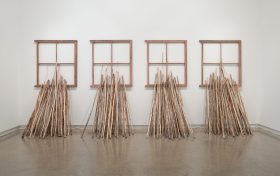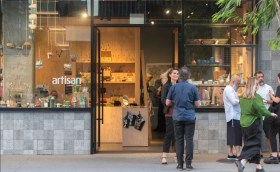Warming up the Arts Centre Melbourne audience before their show, the performers of Hot Brown Honey range about the theatre, encouraging patrons to buy raffle tickets for an undisclosed prize. Given the political tone of the show, one half expects the lucky winner to receive a consciousness-raising exercise in confronting their own unconscious biases or privileges.
But there is no prize. The reality – revealed partway through the show – is both simple and important: the raffle helps cover childcare costs for the mothers in the troupe.
ArtsHub Performing Arts Editor Richard Watts, who attended opening night, was only too happy to see his money go to such a cause. ‘Contributing to childcare costs for the cast of Hot Brown Honey not only frees them up to focus more fully on their performance, resulting in a more enjoyable experience for the audience, but has positive benefits for their children too. Quality childcare matters: stimulating environments for children produce mentally and physically healthier adults, resulting in a better world for all,’ he said.
Watts, who does not have children, said the opening night audience appeared similarly receptive to the idea.
But when he brought the experience back to the office, the ArtsHub team found ourselves vociferously debating the ethics of Hot Brown Honey’s sneaky childcare fundraiser.
Here we share our argument with the ArtsHub audience.
Emma Clark Gratton
ArtsHub writer
Mother of two pre-schoolers
Hot Brown Honey make a good point.
Childcare is everyone’s responsibility. Having children is part of the human experience and as such, the care of children needs to be a societal responsibility. Yes, having children is a choice, sadly not available to all women, but that doesn’t mean we don’t all take responsibility for the next generation.
Childcare is fundamentally a feminist issue. Overwhelmingly, the role of stay-at-home-parent still falls to the mothers. Women full time employees still earn, on average, 82 cents for every dollar earned by their male counterparts and as such are more likely to be the ones to drop out of the workforce after having kids. For wealthy women, staying at home can be a lifestyle choice; for most, the decision as to who works and how much is all about income.
I am an able-bodied white woman living in a capital city, with all the privilege that entails, but I have no problem with my taxes going towards welfare for disadvantaged folks and people who need it more than me. Opposing state-funded or subsidised childcare also means opposing state-funded education, hospitals, roads, aged care, and welfare. Spending money on very young children is entirely consistent with these services. There is no reason why taxpayer money should only kick in at the age of four when a child begins kindergarten.
Gina Fairley
ArtsHub Visual Arts Editor
No children
Having children is a personal choice, and arguably not a career one. While the cost of raising children is high and artists’ salaries are below the average Australian wage, this doesn’t not shift the goal posts for where our responsibilities lie. Our responsibility is to supporting the art form, not the cost of child care of artists.
The lack of full disclosure when fundraising is not only ethically suspect but disingenuous. In this case the audience had already supported the artists by purchasing a ticket to the performance. It was a contract of support – a professional endorsement.
The raffle ticket scenario broke the contract. The audience was there to support an artistic product – not a biological one. What is next then, one might provocatively ask, fundraising for petrol to drive to rehearsals, or the grocery bill to ensure good health for performing?
It is dangerous when, in an already precariously-funded arts ecology, we start to blur the lines of what is our “right” as cultural producers with what is our “ask” as individuals. We need to grow our audience support base at this critical moment, not alienate or hoodwink them. Now, more than ever, the sector needs to be rigorously professional.
Fundraising today is a sophisticated and layered enterprise. As a mode of raising money, raffle tickets lack imagination and ambition and as part of performance piece they fail to tell a story. Perhaps a crowdfunding campaign with full disclosure would have been more appropriate.
David Tiley
Screen Hub Editor
No children
Childcare has long been a fraught issues in the screen sector. Film producers, for instance, have trouble putting childcare into the budget and may resort to using a more generic name, like ‘production assistant’. Across the sector, working conditions are not family friendly. This helps to explain the unacceptable gender disparities. In the freelance sector, having kids is tough with a low income and uncertain work.
I believe very strongly in the idea that it takes a village to raise a child. I don’t have children of my own, but I am really happy to see my taxes used for the common good, and to help other people in the workplace manage the demands of their children.
There are huge financial benefits to having a life partner in the workforce, which are drained in turn by children. On the other hand, I have the freedom and flexibility to concentrate on work, but the long term impact of running a single income household is pretty dire.
Screen and arts workers thrive when we are realistic and disciplined but also when we relate closely to audiences. We shut ourselves off from ordinary life if we don’t sustain a creative community with a healthy work-life balance.
Most people’s lives revolve around their families with all their challenges, triumphs and quiet joys. So should ours. Whether we have children or partners or not may be entirely our own choice, but being part of the wider world matters.
Deborah Stone
ArtsHub Editor
Mother of two adult children
I’m tickled by this little performance piece and, self-evidently, it does what art should – stimulate debate about an important social issue. I love the idea that these performers are able to integrate their personal lives, performance skills and political points.
Paying to see art means paying to be surprised and challenged; in that, Hot Brown Honey succeeded – whatever one’s perspective on childcare.
But the question of how we as a sector and as a society marry our family lives with the demands of a poorly paid, erratic work life is much bigger than the question of subsidised child care.
Rather than just talking about money for child care, we need to be addressing work-life balance, accepting the reality that long working hours apart are rarely ideal for either parent or child. This is a discussion about sustainable livelihoods but it’s also a much bigger cultural question about the place of children in our lives.
Tricking me into paying for your childcare is cute but ultimately little more than a political quip. I would be more excited by art that opens up our toughened, rationalised and money-driven society to the true value of childhood with all its creative and imaginative potential.
Read: Review – Hot Brown Honey
Hot Brown Honey played at Arts Centre Melbourne, the Fairfax Studio, from 6-11 December.






